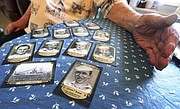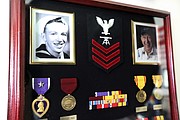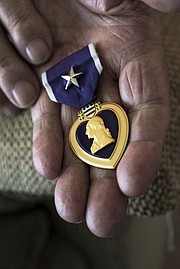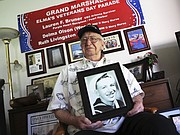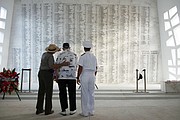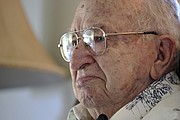USS Arizona survivor heads to Pearl Harbor
HONOLULU (AP) — Lauren Bruner was getting ready for church in 1941 on his battleship, the USS Arizona, when the alarm sounded.
The Japanese attack on Pearl Harbor had begun, and Bruner, then 21, scampered up five stories by ladder to the enormous anti-aircraft guns he was responsible for manning.
But bullets hit his left leg and explosions set off by the Sunday morning bombardment rocked his ship before he could get to the weapons. The ship sank just nine minutes later. Bruner escaped, but suffered severe burns.
This week Bruner, now 96, plans to visit a memorial over the Arizona’s sunken wreckage and attend a remembrance ceremony at Pearl Harbor on the 75th anniversary of the Dec. 7, 1941, attack.
Bruner has traveled from his Southern California home for the events many times, but doesn’t know how long the Arizona’s few remaining survivors will able to keep up the tradition.
“It’s getting close to being the end pretty soon. There’s only five of us left now,” Bruner said.
More than 2,300 servicemen died in the Japanese attack that plunged the United States into World War II. Nearly half of those killed were on the Arizona, most still entombed in the wreckage.
The Navy and National Park Service expect several dozen attack survivors to attend the remembrance ceremony Wednesday on a pier overlooking the harbor. They, along with thousands of others, will observe a moment of silence at 7:55 a.m. — the same minute the Japanese planes hit their first target in the harbor.
Back then, in 1941, Bruner didn’t know who was attacking until the planes got close enough for him to see the red Rising Sun Japanese insignia on their sides. The aircraft shot at “everything in sight,” he said. Then an explosion tore through his battle station.
“That’s where the flames blew right through and cooked me right there,” Bruner said in a telephone interview from his home in La Mirada, California.
With “everything burning,” Bruner tried to get off the ship as fast as he could. But the water in the harbor 80 feet below — infused with leaked oil — was on fire, too, so jumping wasn’t an option.
Bruner and a few fellow shipmates shouted to a sailor on the ship moored next to the Arizona to toss over some rope. The six of them tied the rope and carried themselves hand-over-hand across the 100-foot expanse to the USS Vestal.
“You’re like a chicken getting barbecued,” he said. All of them made it, becoming six of the 335 sailors and Marines on the Arizona to survive. Another 1,177 shipmates died.
Doctors on the USS Solace hospital ship wanted to amputate most of Bruner’s hands, leaving him with just his forefingers and thumbs, he said. Ultimately they peeled off his dead skin and let new skin grow in. They put him in a special bed with hoops that allowed sheets to be draped above him but not touch him.
Navy documents recently uncovered by the genealogy and historical records company Ancestry show Bruner suffered burns on his face and the back of his neck, his right shoulder, right arm and forearm, fingers, hands, outer thighs and lower legs.
The burns on his right arm were particularly severe and took longer to heal, according to the documents, which Ancestry has posted in a special section for Pearl Harbor survivors within its military records site Fold3.com.
Bruner spent seven months recovering but returned to service, he said, because the Navy needed sailors to train new recruits to fight the war. He was on the USS Coghlan when it bombed Japanese positions on Attu Island in Alaska in 1943. His ship later took troops to the South Pacific and was near Guam when the war ended.
He doesn’t like to rehash many details from Dec. 7. He said he just “grins and bears it” to cope with the memories.
“There are parts of this whole thing that I can’t talk about. If I do talk about it, I cannot sleep,” he said.
After the Navy, Bruner went to work for a former Marine’s refrigeration business and spent 39 years with the company. He married twice, but outlived both wives.
Bruner wants his ashes interred inside his old battleship after he dies, like many other Arizona survivors who have chosen to be buried with their shipmates. Bruner said he prefers this to lying in a sparsely visited cemetery.
“I think I’ve got the last spot,” he said, expressing confidence he’ll be the last of the survivors to go.








